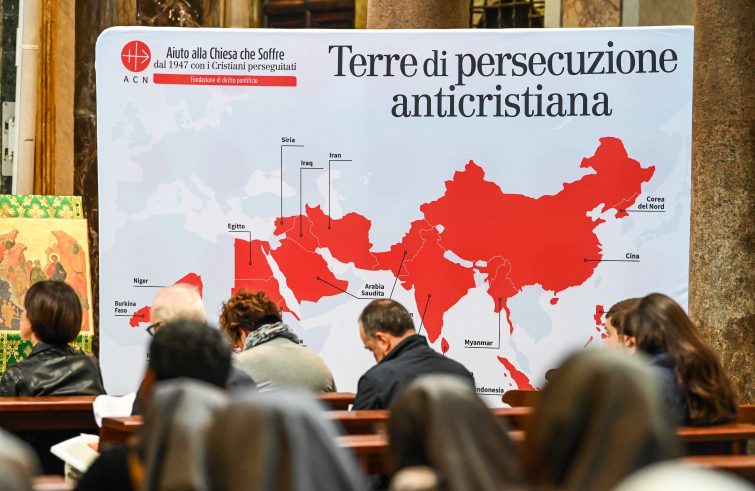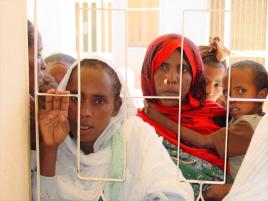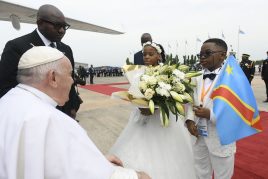
“Solidarity, charity and cooperation”: for Sandra Sarti, the new president of Aid to the Church in Need (ACN) Italy, these are the three key words that describe the mission of the Pontifical Foundation that has been providing support to Christians persecuted or oppressed or suffering material need since 1947.
 “This is done with prayer, information and action,” Sarti told SIR. Taking office as President – she served as an ACN Board member since 2015 – she thanked her predecessor, Alfredo Mantovano, currently Undersecretary at the Presidency of the Council of Ministers, “for the excellent results achieved, further enhanced by the decision to focus on the dissemination of data on the tragic phenomenon of persecution.”
“This is done with prayer, information and action,” Sarti told SIR. Taking office as President – she served as an ACN Board member since 2015 – she thanked her predecessor, Alfredo Mantovano, currently Undersecretary at the Presidency of the Council of Ministers, “for the excellent results achieved, further enhanced by the decision to focus on the dissemination of data on the tragic phenomenon of persecution.”
Raising awareness on the scale of persecution. “As many as 360 million Christians face persecution and discrimination – Sarti pointed out – to the extent that this phenomenon is now referred to as the ‘refugee Church’. Raising awareness on the scale of this persecution is extremely important, providing information on what is happening to our Christian brothers and sisters living in other countries. We plan to pursue this course of action, with the goal of raising greater awareness among the faithful regarding the persecution and discrimination faced by the Christian community to which we all belong. This community must be supported and protected by bringing a message of closeness especially to those regions where Christians are suffering high levels of persecution.” Ms. Sarti mentioned the latest ACN Report, titled “Persecuted more than ever”, which analyses the plight of Christians in 24 countries (October 2020 – September 2022) where violations of religious freedom are of particular concern: “Increased oppression or persecution of Christians was reported in 75% of the countries monitored.
 The Taliban’s return to power in Afghanistan drove the few remaining Christians into hiding. They now live in fear of being arrested, tortured and executed. Extreme anti-Christian persecution in North Korea is believed to be close to genocide, with reports of murders, forced abortions, child slaughter and enslavement. Attacks, kidnappings and killings in Nigeria have increased dramatically with over 7,600 Christians murdered in the two years under review. “In fact, our next Lenten solidarity campaign will be dedicated to Nigeria”, Sarti announced. Christians throughout Africa face the threat of mounting Islamic extremism. Militant organisations like Boko Haram in Nigeria and the Islamic State’s West Africa Province (ISWAP) are actively trying to establish caliphates in the Sahel region, each with its own wali (governor) and governmental structure. Jihadism is one of the reasons why Nigeria is at risk of becoming a failed state. With growing number of abductions and killings of priests, and increasingly frequent attacks on churches.
The Taliban’s return to power in Afghanistan drove the few remaining Christians into hiding. They now live in fear of being arrested, tortured and executed. Extreme anti-Christian persecution in North Korea is believed to be close to genocide, with reports of murders, forced abortions, child slaughter and enslavement. Attacks, kidnappings and killings in Nigeria have increased dramatically with over 7,600 Christians murdered in the two years under review. “In fact, our next Lenten solidarity campaign will be dedicated to Nigeria”, Sarti announced. Christians throughout Africa face the threat of mounting Islamic extremism. Militant organisations like Boko Haram in Nigeria and the Islamic State’s West Africa Province (ISWAP) are actively trying to establish caliphates in the Sahel region, each with its own wali (governor) and governmental structure. Jihadism is one of the reasons why Nigeria is at risk of becoming a failed state. With growing number of abductions and killings of priests, and increasingly frequent attacks on churches.
 An important journey. Faced with this mounting threat, Pope Francis’ apostolic journey to the Democratic Republic of Congo and South Sudan ( January 31-February 5) takes on particular relevance. “This is an important visit that the Congolese bishops have called for. On several occasions they described it as a country on the brink of collapse, threatened by major ethnic and economic tensions,” said the ACN president. “These conflicts have their structural roots in the distant past, and the new Constitution of Congo (dated 2005) is yet to address them. Moreover, let us bear in mind that 96 per cent of the population of Congo is Christian. Congo is the African country with the largest number of Catholics, accounting for 45% of the overall population. Islamic minorities and other faiths make up the rest. There are over 200 ethnic groups in Congo, which are virtually always fighting against each other. In fact, the country ranks 180th on the Human Development Index.” “The Catholic Church’s six archdioceses and 41 dioceses in Congo are in need of support,” Sarti points out, echoing the words of the apostolic nuncio to Congo, Monsignor Ettore Balestrero, who told ACN: “The Pope will try to transform this river of hatred and violence into an ocean of reconciliation. Francis wishes to raise greater awareness of the fact that the future must be built in cooperation with other people, not against them. This is the mission we are carrying out with the Pope.”
An important journey. Faced with this mounting threat, Pope Francis’ apostolic journey to the Democratic Republic of Congo and South Sudan ( January 31-February 5) takes on particular relevance. “This is an important visit that the Congolese bishops have called for. On several occasions they described it as a country on the brink of collapse, threatened by major ethnic and economic tensions,” said the ACN president. “These conflicts have their structural roots in the distant past, and the new Constitution of Congo (dated 2005) is yet to address them. Moreover, let us bear in mind that 96 per cent of the population of Congo is Christian. Congo is the African country with the largest number of Catholics, accounting for 45% of the overall population. Islamic minorities and other faiths make up the rest. There are over 200 ethnic groups in Congo, which are virtually always fighting against each other. In fact, the country ranks 180th on the Human Development Index.” “The Catholic Church’s six archdioceses and 41 dioceses in Congo are in need of support,” Sarti points out, echoing the words of the apostolic nuncio to Congo, Monsignor Ettore Balestrero, who told ACN: “The Pope will try to transform this river of hatred and violence into an ocean of reconciliation. Francis wishes to raise greater awareness of the fact that the future must be built in cooperation with other people, not against them. This is the mission we are carrying out with the Pope.”
The role of dioceses and parishes. “Spreading and transmitting to all Catholics the cries for help of our persecuted brothers and sisters in the world by means of first-hand accounts, news bulletins and reports remains a priority for ACN also for the future,” the president remarked. “The involvement of all dioceses and parishes voicing the suffering of these peoples in need of closeness will be decisive,” she urged. “If people are alone, their need for help feels overwhelming, but when someone is close to them, that need becomes less overwhelming, fostering hope as a result. The dramatic nature of this situation, which is generally overlooked by the media, should be addressed by the local churches. Persecuted Christians should not feel alone and abandoned. As ACN, we will continue to build schools, kindergartens, churches, oratories, clinics, community centres, and to develop education and vocational training projects. These practical actions can provide support to the communities. We must work with young people to inspire them with ideas for a brighter future.”












